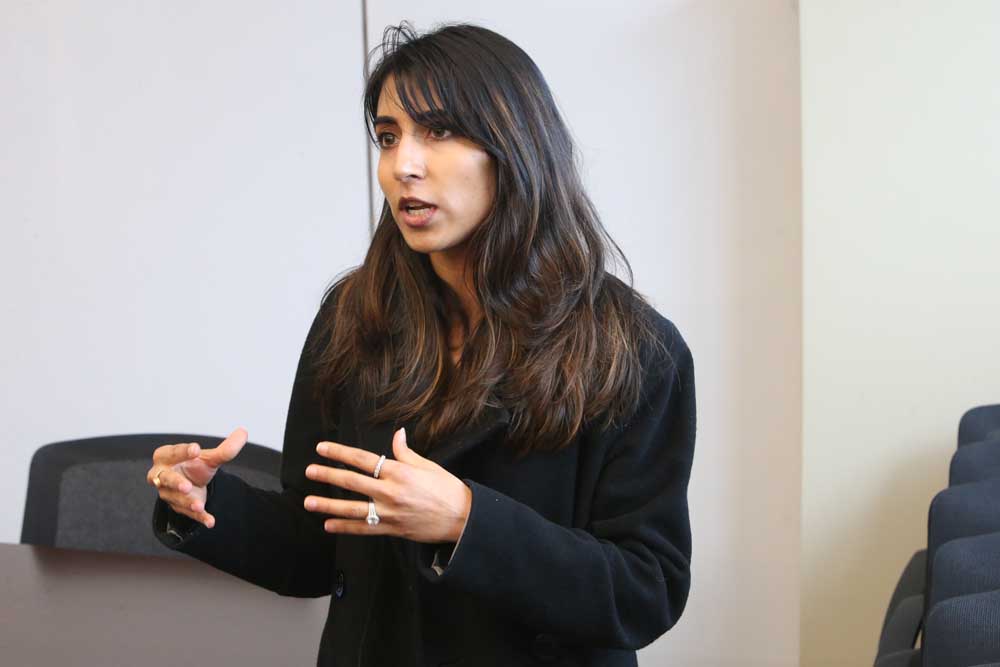Oregon Health Authority director makes rounds in Bend as part of statewide tour
Published 5:45 am Tuesday, April 30, 2024

- Oregon Health Authority Director Dr. Sejal Hathi answers questions while touring a Mosaic Community Health center in Bend on Monday afternoon.
When Oregon Health Authority Director Dr. Sejal Hathi started her new role late last year, it quickly became apparent that doing her job well meant getting out on the road to better understand the intricacies of health care in Oregon.
With that in mind, Hathi came in Central Oregon this week to meet with health care officials at several facilities. Monday’s tour included visits to PacificSource and Mosaic Community Health. On Tuesday, she’s scheduled to meet with health authorities for Deschutes, Crook and Jefferson counties along with a visit to the Deschutes County Stabilization Center.
Trending
“My first couple of months here made patently clear that Oregon is not a homogeneous state,” Hathi said on the sidelines of a meeting with staff at Mosaic Community Health in Bend. “What may work for Pendleton or for Astoria may not work for Central Oregon.”
Hathi’s visit to Central Oregon is part of a wider tour of the state to identify health priorities and to meet with regional health officials at the start of her term. She has already visited five regions and plans to visit Hood River and Pendleton next month.
Even within Central Oregon, the needs and the priorities of communities can be different between its cities and towns, Hathi acknowledged. She said visiting small communities will give her a different perspective and a “nuanced appreciation” of the needs at each facility.
“With these visits, I am hoping to hear directly from community leaders, providers, payers, the people who have been doing the work,” she said.
During her tour Monday she also spoke of working closely with Oregon’s tribal communities to reduce inequities and address the specific needs of Indigenous people.
Trending
Deschutes County has a shortage of behavioral health specialists, but so does everywhere
Syphilis is on the rise in Central Oregon
Deschutes declares emergency for fentanyl crisis
In Deschutes County, just 89% of school-age kids are fully vaccinated
“We are in the midst of crafting a strategic plan for the agency to achieve our 2030 goal of eliminating health inequities,” she said. “One of our goals toward achieving that 2030 vision is being constructed in partnership with tribal nations to specifically address their needs… We look forward to working in partnership with them to devise what the next six years should look like.”
Hathi’s experience
Hathi was appointed to Oregon’s top health position in November by Gov. Tina Kotek and served in an interim role until being confirmed by the Legislature in February.
Before her appointment, Hathi, 32, served as New Jersey’s deputy health commissioner for public health services. She also worked for the Biden administration for two years as a senior White House policy adviser. Hathi studied at Stanford and early in her career served as a resident physician at Massachusetts General Hospital.
Those experiences will come in handy as she tackles some of Oregon’s biggest health challenges. During her visit to Central Oregon, health officials plan to highlight this area’s specific needs.
Local needs
Elaine Knobbs-Seasholtz, director of strategy and development for Mosaic Community Health, said a hurdle for the nonprofit is hiring and retaining staff in an expensive part of the state.
Hathi “is aware of that workforce challenge,” said Knobbs-Seasholtz “It’s giving her the context of what that means for Central Oregon and how it impacts our patients.”
Knobbs-Seasholtz said she hopes the state can help by partially or wholly paying off education loans taken out by medical staff.
“There is a state loan program for providers, so that is something that OHA can get out more of and fund more of so something like that can be a leverage tool that can help all the areas of Oregon facing workforce shortages so we’re going to emphasize that to her.”
Heather Kaisner, public health director for Deschutes County Health Services, intends to bring up the need for sustainable funding for core public health services.
“Emergency funding for COVID-19 is coming to an end and local public health continues to face emerging and re-emerging public health threats with decreasing resources,” said Kaisner.
Consistent resources are needed to deal with increasing syphilis rates, said Kaisner. Last year the syphilis rate in Deschutes County was 26.6 people per 100,000, up from 14.5 people per 100,000 in 2022 and 4.3 people in 2014.
She also highlighted rising drug overdoses as problematic. In 2018, just 11 people died from overdose compared to 25 such deaths in 2022.
Another problem is a decrease in childhood vaccination rates, which leads to a reemergence of vaccine-preventable diseases. Last year 87.1% of incoming kindergartners were fully vaccinated compared to 89.5% a decade ago and 93.5% in 2008.
“The state could invest more in local upstream prevention efforts and help bridge the connection at the state level between population-based public health and individual physical and mental health care,” Kaisner said.
Funding problems coming
Hathi said federal funding in the billions of dollars unleashed during the pandemic “is rapidly coming to an end” and budgetary austerity is on the horizon.
“We are going to have to find ways to do more with less,” she said. “That is a tricky situation to be in.”
It’s visits to areas across Oregon that Hathi hopes to find those solutions to stretch available dollars. Tapping into local knowledge, she believes, will help her to address challenges.
“This community’s needs, their priorities, their specific perspectives on our approach to those challenges will be embedded in and reflected in the strategies and the actions as an agency we take,” she said.








